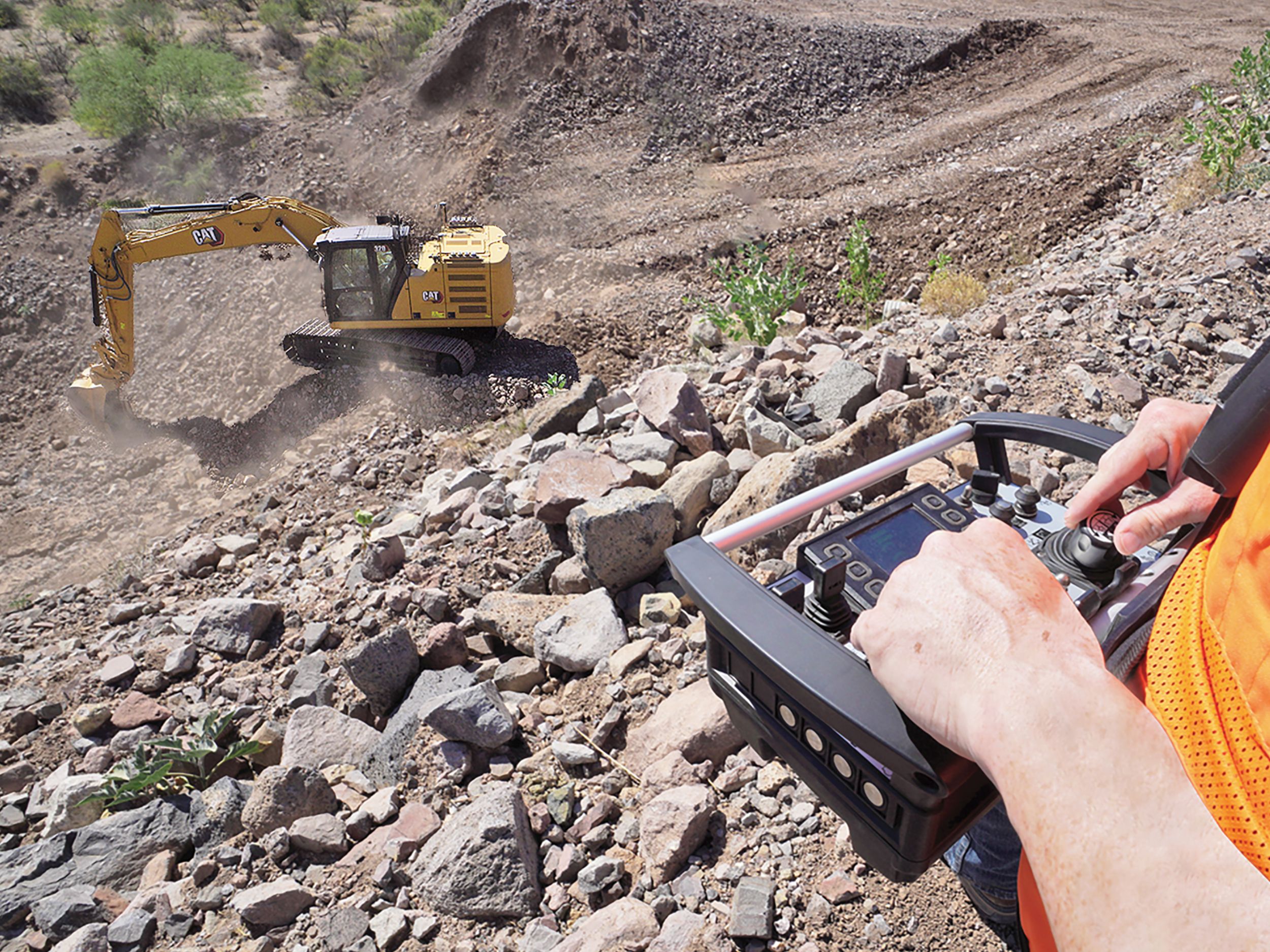The Ultimate Guide to Mastering the Handling of a rc excavator on Your Construction Site
Recognizing Exactly How Excavator Functions and Its Influence On Performance
Excavators play an important duty in construction and mining operations, depending on a complex interplay of hydraulic and mechanical systems. Their capacity to perform a variety of jobs hinges on both their style and the technology integrated within. Recognizing these parts can greatly influence functional efficiency and productivity. As developments continue to reshape the industry, one must take into consideration just how these changes will influence future methods and performance.
The Basics of Excavator Mechanics

The Function of Hydraulic Solutions in Excavators
At the heart of excavator procedure exists the hydraulic system, which plays an essential duty in powering the equipment's movements and features. This system uses pressurized hydraulic liquid to transfer energy, allowing numerous activities such as swinging, training, and digging. By using the concepts of hydraulics, excavators can carry out jobs with exceptional precision and force, boosting overall functional efficiency.The hydraulic system includes essential elements, including cylinders, valves, and pumps, which interact to manage the circulation and direction of the fluid. When the operator involves the controls, the hydraulic liquid is directed to details cylinders, converting the driver's commands right into physical activity. This mechanism allows for smooth and receptive actions, which are necessary in building and construction and excavation environments. double e volvo rc excavator. The performance of the hydraulic system straight influences the efficiency and convenience of the excavator, making it a vital aspect in contemporary excavation procedures
Key Parts of an Excavator
Recognizing the key elements of an excavator is necessary for grasping just how this powerful maker runs. An excavator includes numerous considerable elements, including the undercarriage, home, arm, pail, and boom. The undercarriage offers stability and wheelchair, often featuring tracks or wheels to browse different surfaces. The house has the engine and hydraulic systems, permitting the operator to control movement and power the equipment. The boom expands from your house, enabling vertical reach, while the arm links to the container, promoting excavating and lifting operations.Additionally, the cab houses the operator, geared up with controls for precise maneuvering. Each of these elements plays a crucial duty in the excavator's overall functionality, adding to its effectiveness and performance on building websites. Comprehending these components aids in maintaining and enhancing excavator efficiency, making certain tasks are finished safely and efficiently.
Accessory Versatility and Its Advantages
Accessory adaptability is an essential aspect of excavators, making it possible for operators to switch in between numerous tools tailored for specific tasks. This adaptability not only enhances task performance yet also contributes to cost-effectiveness by lowering the need for multiple makers. Understanding the different kinds of accessories available can significantly influence the general performance and capability of an excavator on task sites.
Kinds of Attachments
While excavators are mainly identified for their digging capacities, their real convenience depends on the vast array of add-ons available. These attachments boost the excavator's performance, enabling it to execute numerous tasks past excavation. Typical add-ons include pails (for excavating and scooping), hydraulic thumbs (for grasping materials), and augers (for piercing holes) Grapples are utilized for moving and dealing with debris, while rippers can damage up tough surface areas. Other specialized add-ons, such as plates and rakes, enable excavators to adapt to specific work demands. This variety not only boosts the equipment's utility across various industries, including building and construction, landscape design, and demolition, but additionally permits operators to tailor their equipment to fulfill certain job needs effectively.
Boosted Work Effectiveness
Optimizing job performance is a primary advantage of utilizing different excavator accessories. Different attachments permit an excavator to carry out multiple jobs without needing to switch over tools, saving important time and labor. Making use of a hydraulic hammer can break concrete while a pail attachment can dig deep into soil, making it possible for a seamless operations. This adaptability lowers downtime connected with devices changes and boosts productivity on-site. Furthermore, specialized attachments boost accuracy in tasks such as grading or landscaping, resulting in better results. The capacity to adjust to various job requirements not only simplifies operations however additionally lessens the demand for added machinery, making certain that tasks are completed swiftly and efficiently. On the whole, add-on flexibility significantly adds to increased work performance in excavation job.
Cost-Effectiveness and Adaptability
Cost-effectiveness is a substantial benefit of making use of versatile excavator accessories. These attachments enable a solitary excavator to do several jobs, decreasing the need for added equipment and labor - double e volvo rc excavator. By switching over in between containers, hammers, and grapples, operators can deal with numerous projects, from excavating to demolition, consequently optimizing tools application. This adaptability not just decreases operational expenses yet likewise decreases downtime connected with changing tools. Furthermore, the capability to personalize excavators with specialized add-ons boosts efficiency, as they can successfully take care of diverse jobs according to task demands. To wrap up, the combination of cost-effectiveness and convenience in excavator attachments adds to boosted functional effectiveness and source allotment in construction and excavation jobs

Advanced Modern Technology in Modern Excavators
Modern excavators are significantly furnished with innovative modern technology additional hints that changes excavation procedures. Automation streamlines operations, while improved gas performance reduces operational costs. In addition, clever control systems enhance precision and safety, noting a considerable development in excavation equipment.
Automation in Excavation Processes
As excavation modern technology progresses, automation has actually become a vital component in enhancing efficiency and precision on work websites. Modern excavators are equipped with innovative automated systems that help with jobs such as grading, digging, and trenching with minimal driver intervention. These systems utilize sensing units, GPS, and artificial intelligence algorithms to assure precise placing and depth control, substantially minimizing the margin for error. Furthermore, automation enables drivers to focus on tactical decision-making as opposed to manual controls, causing boosted productivity generally. Such developments not just streamline process yet also improve safety by lessening human error in complicated procedures. Subsequently, the integration of automation in excavation processes represents dig this a considerable improvement in construction innovation, driving the sector towards higher effectiveness and performance.
Enhanced Fuel Effectiveness
Innovations in technology have likewise brought about substantial enhancements in gas effectiveness for contemporary excavators. Modern machines are geared up with advanced engines that optimize power outcome while minimizing gas intake. These engines use ingenious burning modern technologies, such as turbocharging and straight gas shot, to boost performance and effectiveness. Additionally, light-weight products in construction reduce total weight, permitting less energy expense throughout operation. The intro of variable rate controls makes it possible for operators to adjust engine performance according to particular jobs, additionally lessening fuel use. Because of this, these enhancements not only reduced operational prices yet likewise contribute to ecological sustainability by reducing discharges. Overall, enhanced gas performance in excavators is a vital advancement that reinforces productivity and economic feasibility in the building and construction industry.
Smart Control Solution
While drivers browse increasingly complicated work sites, click to read wise control systems in excavators have emerged as vital devices for boosting efficiency and accuracy. These innovative innovations utilize algorithms and sensors to check numerous specifications such as load weight, terrain conditions, and functional performance. By automatically readjusting hydraulic features, clever systems maximize machine performance, leading to improved efficiency and lowered wear on elements. Additionally, drivers take advantage of instinctive interfaces that give real-time comments and diagnostics, permitting informed decision-making. This combination of technology not just streamlines procedures yet additionally minimizes human error, adding to more secure work atmospheres. As the building industry proceeds to evolve, clever control systems will certainly play a vital function fit the future of excavator performance and efficiency.
Enhancing Operational Efficiency With Excavators
Excavators play an important role in boosting operational effectiveness across different building and excavation projects. Their versatility permits numerous tasks, including excavating, material, and training handling, which simplifies process and decreases the demand for extra equipment. With effective hydraulic systems, excavators can execute heavy-duty tasks with precision, substantially reducing the time called for to total projects. The assimilation of sophisticated technology, such as GPS and automated controls, further maximizes their operation, enabling drivers to achieve better precision and decrease material waste. In addition, contemporary excavators are created to eat much less gas and lessen discharges, adding to both price savings and environmental sustainability. By utilizing excavators properly, building teams can enhance performance, satisfy job deadlines, and enhance total site monitoring. This multifunctionality and efficiency make excavators essential tools in the modern-day construction landscape.
The Future of Excavators in Construction and Mining Industries
As the construction and mining markets evolve, the future of excavators is poised for significant improvement driven by technical advancement and transforming operational demands. Advancements in automation and expert system are reshaping excavator capabilities, permitting improved accuracy and efficiency in operations. Self-governing excavators are arising, decreasing the need for human treatment and reducing the risk of accidents.Moreover, the assimilation of telematics and IoT technology enables real-time tracking of equipment performance and anticipating upkeep, optimizing uptime. Environment-friendly designs, including hybrid and electric designs, are getting grip, aligning with sustainability goals within the industry.Additionally, the usage of innovative materials and lighter designs improves gas performance while maintaining performance requirements. As these fads progression, excavators will certainly play a vital role in meeting the boosting demands for efficiency and security in building and construction and mining, ultimately changing operational landscapes.
Often Asked Questions
How Do Climate Condition Impact Excavator Performance?

Climate conditions greatly influence excavator performance, as rain and mud can hinder grip and security, while severe temperatures may influence hydraulic systems. Operators needs to adjust to these variables to assure ideal functionality and safety and security throughout operations.
What Safety And Security Procedures Should Operators Adhere To While Utilizing Excavators?
Safety procedures for excavator operators include using appropriate individual protective equipment, conducting pre-operation evaluations, making certain appropriate communication with ground workers, maintaining a safe range from overhead hazards, and adhering to well-known operational methods to avoid crashes.
Just How Typically Should Excavators Be Preserved for Optimal Efficiency?
Excavators ought to be kept consistently to guarantee peak efficiency, typically every 250 operating hours or as specified by the supplier. Routine checks improve integrity, avoid unexpected failures, and prolong the life-span of the equipment.
What Is the Ordinary Lifespan of an Excavator?
The ordinary lifespan of an excavator normally varies from 10,000 to 15,000 hours of procedure. Elements affecting long life include upkeep methods, operating conditions, and the top quality of the machine itself, affecting overall productivity and efficiency.

Can Excavators Operate Uneven Surface Successfully?
Excavators can operate successfully on unequal surface due to their expressed designs and flexible tracks. These attributes allow them to keep security and grip, making it possible for efficient procedure in tough settings generally come across in building and construction and landscape design jobs. Each of these parts plays an essential function in the excavator's total capability, adding to its performance and efficiency on building and construction websites. Making the most of work effectiveness is a primary advantage of making use of different excavator accessories. While drivers navigate progressively intricate task websites, smart control systems in excavators have emerged as essential devices for boosting efficiency and accuracy. Excavators play an important role in improving operational performance across different construction and excavation projects. Breakthroughs in automation and fabricated knowledge are improving excavator capacities, enabling for improved precision and performance in procedures.